Instagram is slowly limiting political content, in the process nuking your friendly political content creator. But these social media warriors use hacks to bring you the facts before you vote

Pic/iStock
Scrolling through Andheri West Shit Posting’s Instagram feed is like strolling past a well-stocked shaadi ka buffet table. Chinese, Italian, salads, chaat, sushi… There’s something for everyone. If one post talks about how the Central government granting magisterial posts to local priests could be a politically-charged move, another is a clip of Jackie Chan saying “Cheese” instead of “Freeze” in a Rush Hour blooper. The third urges daily commuters on the Virar Fast to speak to their local MP about allotting more trains to counter overcrowding, but the next one is Winnie the Pooh floating away to happiness on the IPL theme.
This content khichdi is a well-thought out plan by Balram Vishwakarama, the force behind the handle which has 128K followers. It’s a strategy directed over the past year when he restarted his page, which he had shut down in 2020. “From 50,000 likes and 3,000 comments,” he says, “posts started getting only 200 likes. Sometimes, this trend would continue for three days, sometimes, a week, and sometimes, a whole month. In content creator world lingo, I got Zucked [a verb stemming from the Meta founder Mark Zuckerberg’s last name]—the algorithm killed the reach. It got so bad that I shut the page down.” So now, he “micro doses” the audience with political content. “I hide it between the multiple other posts on cricket or humour, so the algorithm doesn’t pick it up. Out of every five posts, you will find one on social or political issues.”
ADVERTISEMENT
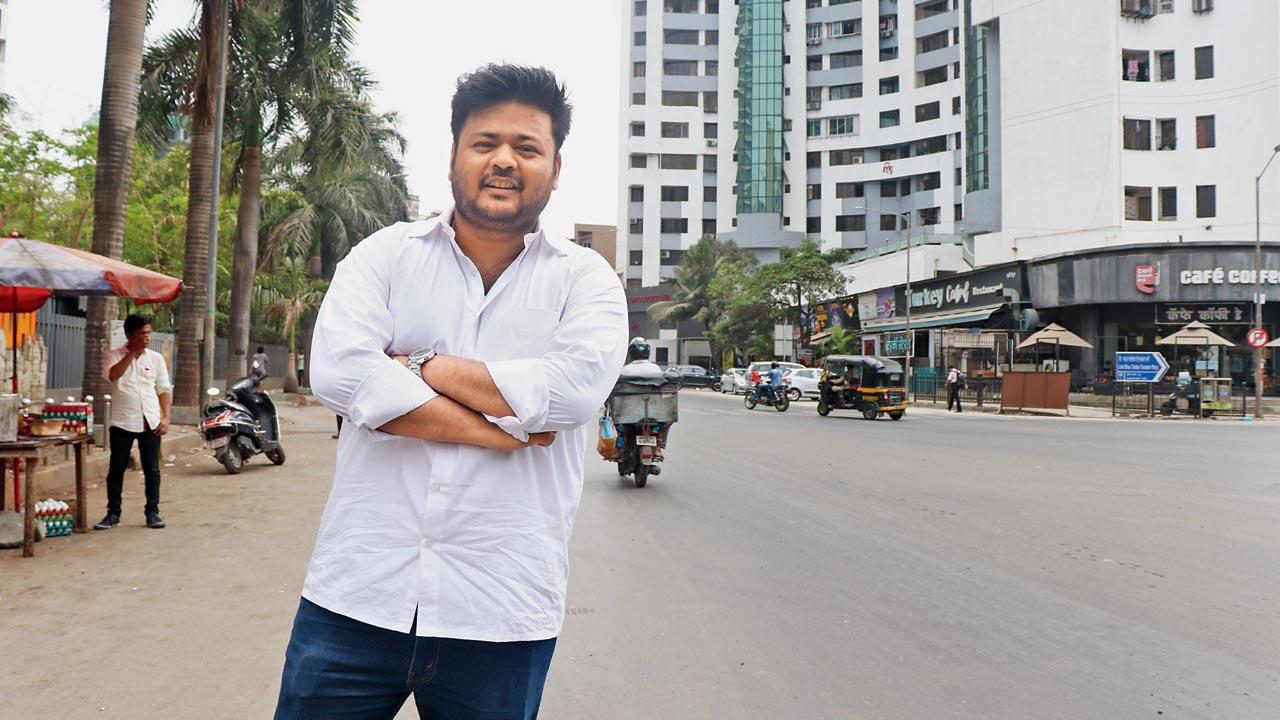 Balram Vishwakarma, aka Andheri West Shit Posting, said the best way to avoid shadow banning is by keep the messaging subtle. Pic/Anurag Ahire
Balram Vishwakarma, aka Andheri West Shit Posting, said the best way to avoid shadow banning is by keep the messaging subtle. Pic/Anurag Ahire
Vishwakarama’s experience is every content creator’s worst nightmare, especially in the current scenario, where social media platforms are limiting the political content one can see on their feed. Instagram has slowly started an automatic clampdown on the volume of political content—which it defines as posts about laws, elections or social topics—from accounts people don’t already follow. This will also affect Threads.
And the app doesn’t inform you of this change. There is an easy way to turn off the controls: Go into Settings, and choose See political content. But many are worried that since the definition of political content is wide, they will miss information important especially in the year of General Elections. Internationally, America also comes out to vote this year.
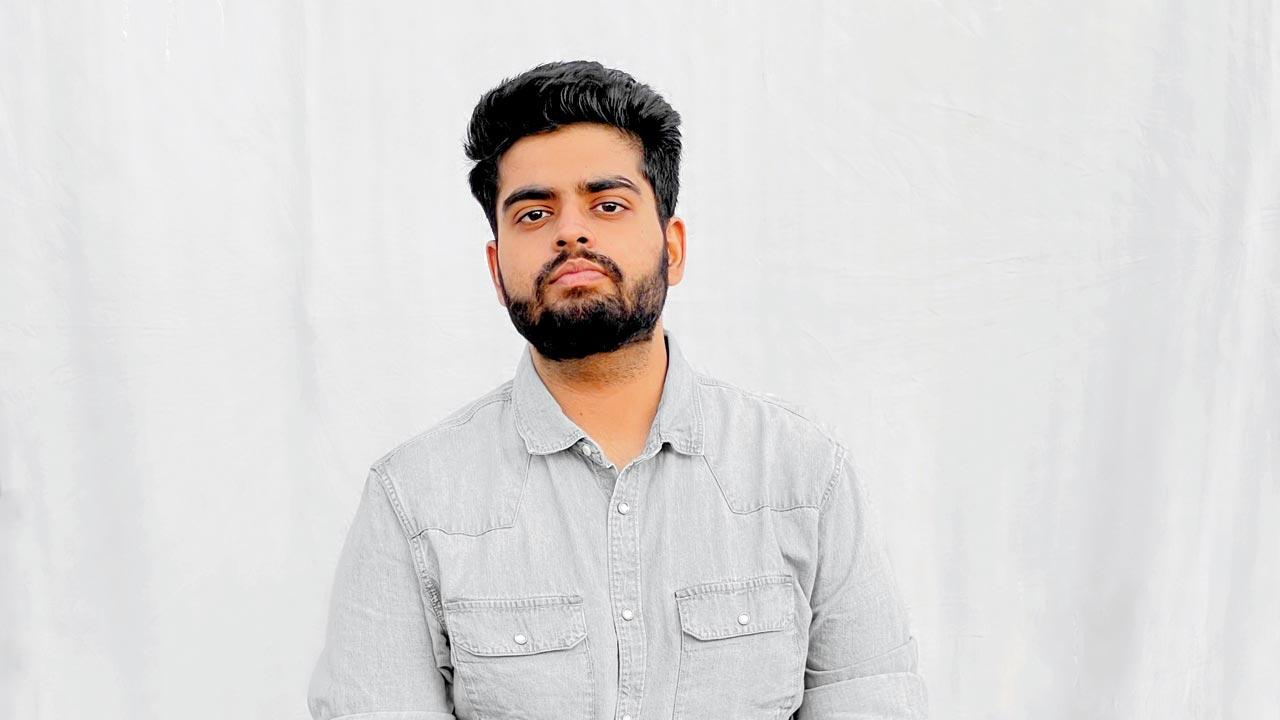 Jitendra Sharma, who goes by the massively popular handle Ted The Stoner on Instagram, was shadow banned twice in the last year
Jitendra Sharma, who goes by the massively popular handle Ted The Stoner on Instagram, was shadow banned twice in the last year
Meta recently said, “If you decide to follow accounts that post political content, we don’t want to get between you and their posts, but we also don’t want to proactively recommend political content from accounts you don’t follow.” This latest move may not only infringe on social media’s role of driving change, but also restricts the scope of free and honest discourse. Living in a world where social media billionaires treat humans like contestants in a video game where the remote is in their hands, this move may seem like the natural next step. But there was a time when Meta was seen as an important decider in Barack Obama’s win, or as a platform which gave rise to multiple social revolutions.
“We need to remember that influencers are a big part of political messaging,” says author and political commentator Kunal Purohit. “You saw that the government reached out to them to promote policies and initiatives. Big ministers gave interviews on YouTube shows. National creator awards were handed out. So, they are very important. When you understand that, then on the other side, you see there is a silencing of the influencers who are critical of the government.”
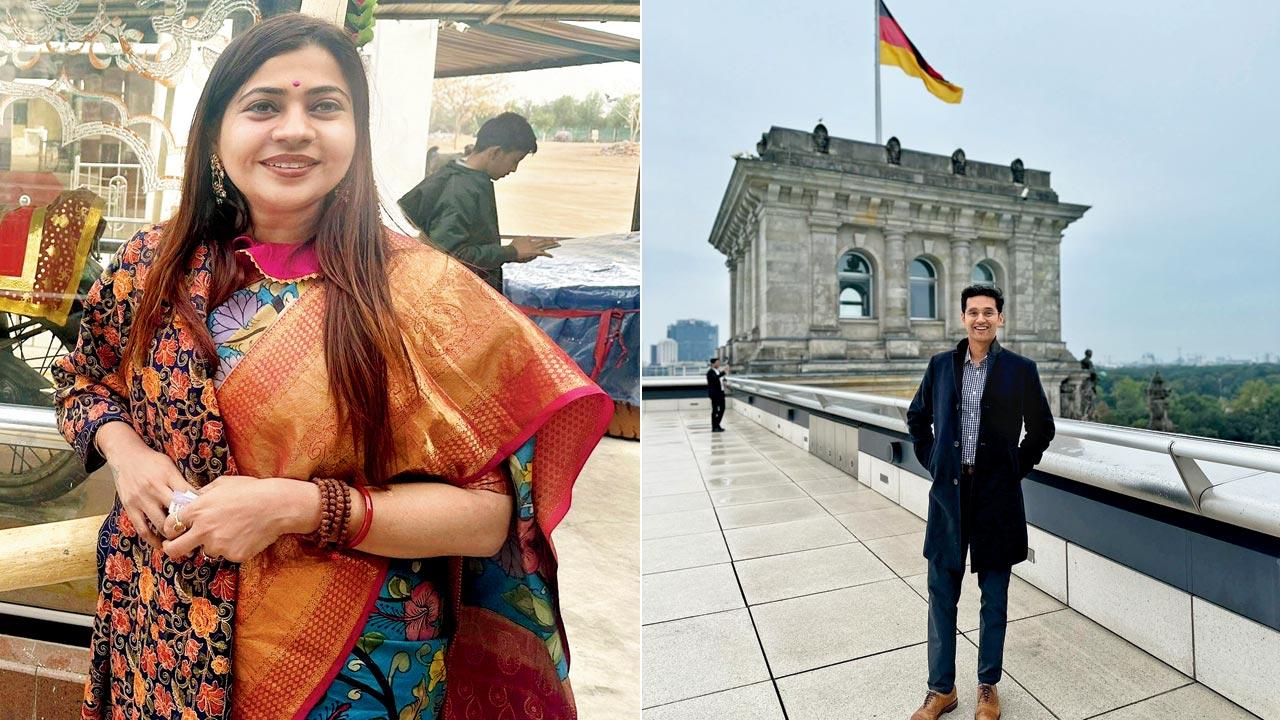 BJP’s S Shalini says that Meta has been shadow banning political content since day 1, even if they have said that the policy is rolling out now; (right) Creator Sudhanshu Kaushik feels its unfair to blame social media platforms. “One should focus on making their content close a gap,” he says
BJP’s S Shalini says that Meta has been shadow banning political content since day 1, even if they have said that the policy is rolling out now; (right) Creator Sudhanshu Kaushik feels its unfair to blame social media platforms. “One should focus on making their content close a gap,” he says
There are others in Vishwakarama’s boat, all attempting to spread awareness about multiple political agendas and trying hard to thwart the social media giant’s efforts to shadow ban them.
Shadow banning is usually defined as: “The practice of blocking or partially blocking a user or the user’s content from some areas of an online community in such a way that the ban is not readily apparent to the user, regardless of whether the action is taken by an individual or an algorithm. For example, shadow-banned comments posted to a blog or media website would be visible to the sender, but not to other users accessing the site”. This means that most of these creators won’t show up on the Explore tab, and will notice a drastic fall in followers, and engagement.
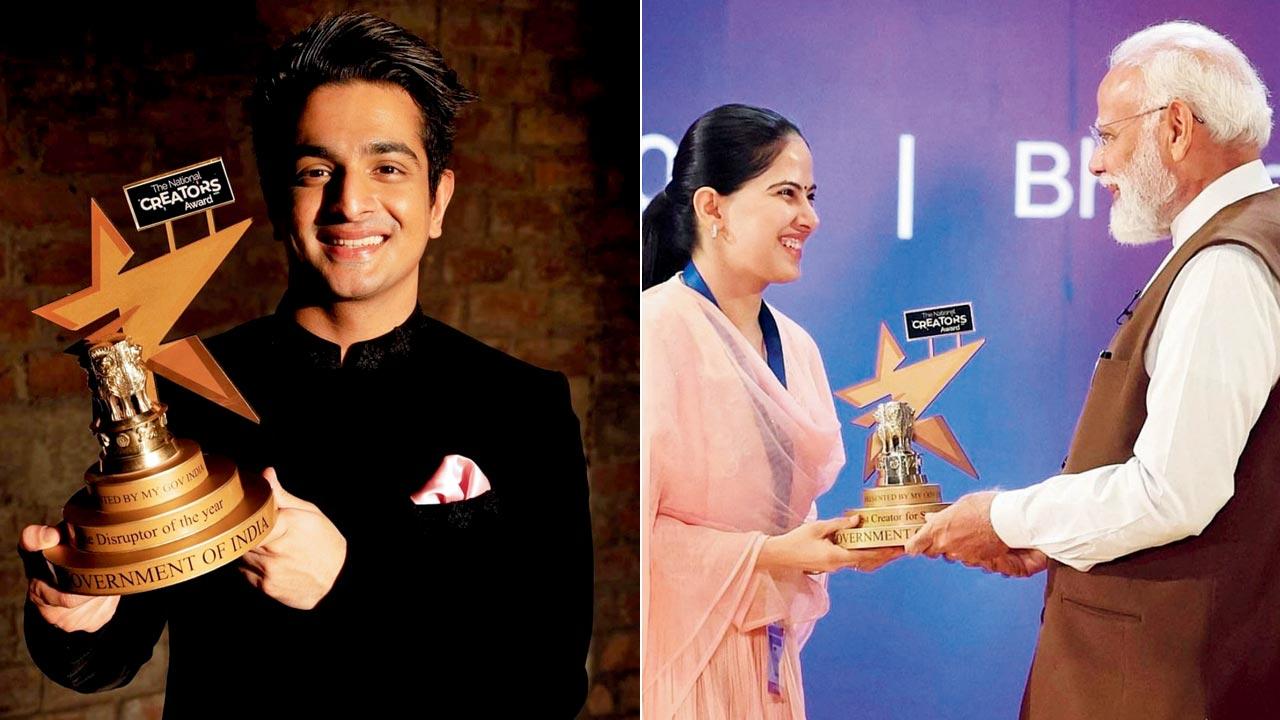 Content creators Ranveer Allahbadia and Jaya Sharma both won National Creator Awards this year for “Disruptor of the Year” and “Best Creator for Social Change”. This was the first edition of the National Creator Awards, which PM Modi personally presided over. Pics/Instagram
Content creators Ranveer Allahbadia and Jaya Sharma both won National Creator Awards this year for “Disruptor of the Year” and “Best Creator for Social Change”. This was the first edition of the National Creator Awards, which PM Modi personally presided over. Pics/Instagram
Jitendra Sharma, popularly known as Ted The Stoner with 1.7 million followers, says he has got shadow banned twice last year. One was for a video which showed a girl being molested on Holi, and another that showed a teacher punching students in class. “I had edited the videos, and the identity of the victims was not revealed,” he says, “The purpose was to get justice. But here’s what I realised: It’s not about intent, it’s about content. That was the consensus even when I spoke to people at Meta; AI picks up some words or images, bans you based on them. However, many people get away with it, so yes, it’s unfair for sure. I used to get affected, but now I just keep going.”
There are others doing work on the ground level, and for specific communities, trying to get noticed. Mass communicator and TV journalist from Noida Harsh Trivedi’s series Beyond the Mainstream has 21,000 followers on Instagram. His popular Reels have covered obscure constituencies in Chhattisgarh during the Vidhan Sabha elections last year. He believes that many influential, national-level political commentators fail to understand the power of grassroots information conveyed through a medium associated with mainstream reach.
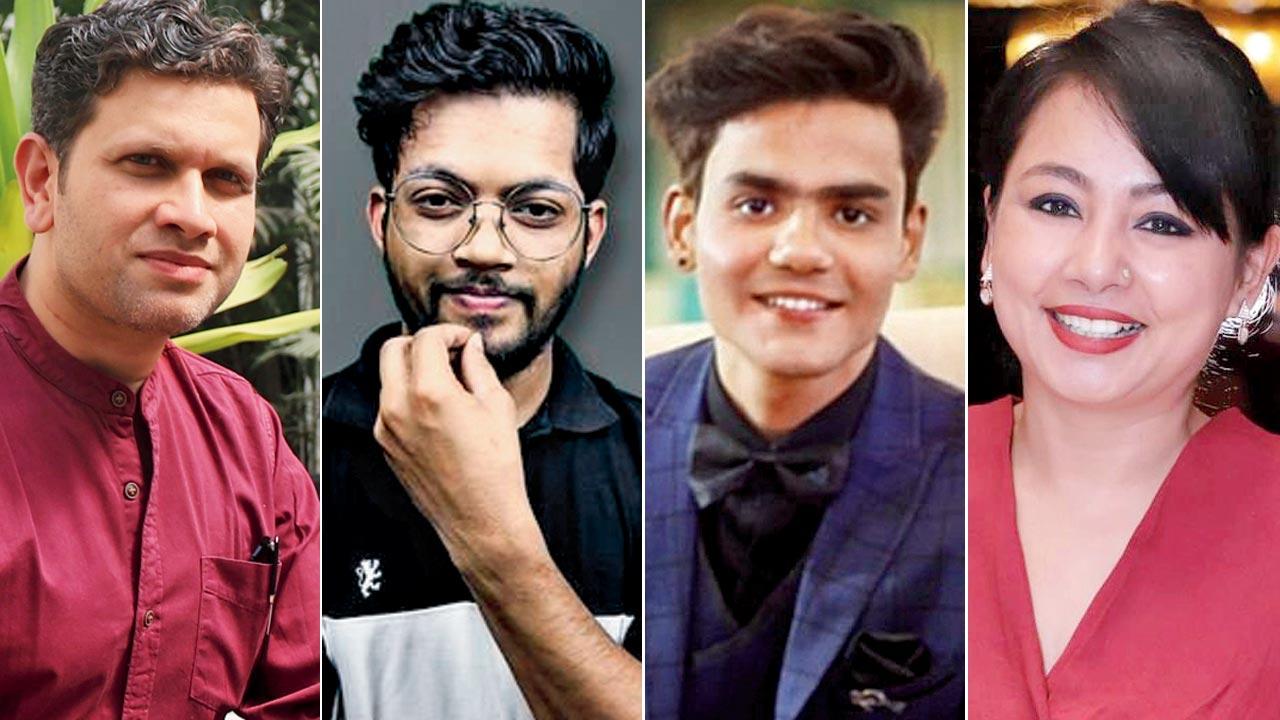 Kunal Purohit, Mukesh Mohan, Harsh Trivedi and Smita Khanna
Kunal Purohit, Mukesh Mohan, Harsh Trivedi and Smita Khanna
“These seats may not be big wins for political parties, but it’s called micro catering,” says Trivedi. The after effect was that he received tip-offs from other areas and regional influencers. Keeping it niche worked. “If I am covering Bilaspur constituency, Instagram picks up videos that are shared a lot. These users are mostly those who belong to Bilaspur. This is how numbers grow,” says Trivedi.
However, things have not been so easy for Mukesh Mohan, a Dalit/Ambedkarite political content creator who has been shadow banned in the past few months. “I am not sure what ‘shadow-banned’ means, but I know my videos are vanishing into thin air,” says Mohan. The Delhi-based political commentator, who often talks about Dalit-centric policies and highlights incidents of violence towards his community, saw 12-13 videos being arbitrarily removed. “I have been complaining, but the platform never responds,” he says. “This has grown acute in the last two to two-and-a-half-months. Videos that would earlier garner, say one million likes, now hardly get 500. I read somewhere about the political preference setting, even if they have not rolled it out yet. They have definitely been doing something that reduces our reach.” Mohan says that his video on a Dalit man being urinated upon in Madhya Pradesh was taken down within 24 hours of being posted.
And then there are those who say it’s premature to blame all problems on social media. Sudhanshu Kaushik, Founder of Young India Foundation that educates the youth about voting rights and the registration process, has more than 13,000 followers on Instagram. He has also written a book called The Future Is Ours: The Political Promise of India’s Youth. Kaushik has been roped in by Meta to promote youth voting as a part of their social change programme. He holds that shadow-banning is yet to pick up pace in India, and the selective censorship experienced by influencers is determined more by what’s popular and what’s boring. “If I post a pretty face I will get more likes,” he says. “It’s irrational to blame the algorithm or platform. If you love what you’re doing, keep at it. We are not optimising the narrative, but rather looking at what has been missing, and asking ourselves, ‘Are we being resourceful instead of trying to go viral? Are we closing a gap?”
And the BJP is here to tell you that it’s not only anti-government creators who are being shadow banned. S Shalini, who spearheads the party’s Maharashtra social media and IT cell, believes that Meta has been playing dirty since day one. “Meta India should follow the law of the land,” she says. “Our leaders such as Ashwini Vaishnaw (Communications, Electronics & Information Technology) have been raising these issues regularly. The algorithm, somehow, does not suit our kind of content. We don’t want to talk about religion, but if we have built a Ram Mandir in Ayodhya after the failure to do so for 500 years, then we want to talk about it. But you [Meta] may see it as religious content being an international company. You don’t understand what it means in the Indian context, and this is not our fault.”
Shalini holds that Meta was slyly limiting political much before their public announcement.
“The only reason we have been successful [in reaching followers] is because we have been calling them out,” she says. “What we have been doing through our karyakartas is just overwhelming their system as the sheer volume of people is massive. We are able to bulldoze the algorithm but does that mean the algorithm is fair? No. We are not fighting one person but an entire ecosystem. There is a reason why our NaMo and Saral apps have been successful; they give our people a direct connection to us.”
It’s not easy being on social media; and to be famous and successful is learning to be resilient and bounce back. It also means reinventing oneself and figuring out hacks to keep afloat.
Along with sandwiching political posts between random content, Vishwakarama also has changed the account’s language. “I used to be all about right and wrong, and try to influence my reader. Now, I am subtler; I just share an experience and leave it to them to figure it out. I feel that every follower is a rational person and will make the right decision.” This is much like Sharma, who says instead of name-calling or talking about a particular party, he now just focuses on an issue. “Also, format matters,” he says. “For example, Dhruv Rathee is more successful as he mostly focuses on Reels, a format Meta is promoting.”
Others, like Dr Medusa on X who has 125.6k followers, say that there are multiple smart and innovative ways to avoid being detected. “During the Watermelon Revolution, instead of Palestine, we would put an emoji of the watermelon, so it couldn’t be caught. And users started putting it with any tweet, even the ones not related to Palestine, so it wouldn’t be isolated,” says the 38-year-old linguistics teacher from UP. When the Israeli government had banned the public display of the Palestinian flag in Gaza and the West Bank, Palestinians had begun to use the watermelon. The idea was that when a watermelon is cut open, it reflects the colours of the flag: red, black, white and green. “I frame content in such a way that it can’t be seen as offensive; I do it in a satirical way. When Kejriwal was jailed I said, ‘He should be jailed. How can he not share the money with the boss?’ The ones who could be offended didn’t get it,” she laughs.
Virendra Saini, who handles the accounts of political creators in Rajasthan, says social media platforms also limit your reach as they want you to spend money on advertising. “We do that [advertise], but we also use the tools given by the social media app. For example, make content using only the Reels app. We don’t upload edited videos. We also collaborate with influencers who have nothing to do with politics, but have our target audience.”
Social media strategist Smita Khanna, COO of Newton Consulting India, says the best way to avoid being shadow banned is to “not focus on negative campaigning. Don’t malign people. Keep it to the issue.” She also suggests that creators maintain a presence on multiple platforms so that the messaging can be sustainably done.
But in the end, it could just be about working with what you have, instead of trying to change the system. As Vishwakarama puts it, “It’s best to change the tonality. Everyone who started out with me has stopped barking, for the lack of a better word. The new ones are trying, but they will be silenced soon. Best to adapt. Yeda ban ke peda khao.”
 Subscribe today by clicking the link and stay updated with the latest news!" Click here!
Subscribe today by clicking the link and stay updated with the latest news!" Click here!








